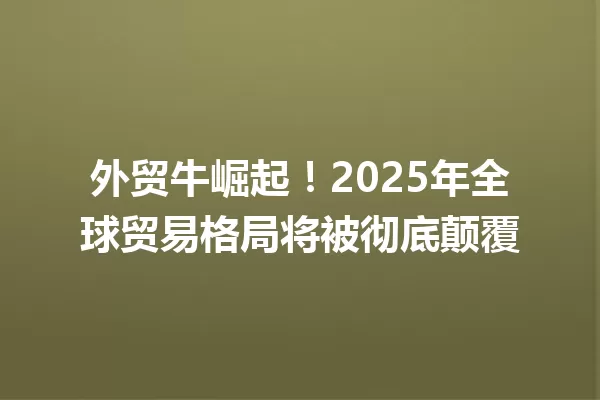
The term “Foreign Trade Bull” paints an optimistic picture of a rapidly evolving international trade environment, as we move toward
Transformative Technologies Impacting Trade
One of the primary drivers of the rise of the Foreign Trade Bull is the integration of transformative technologies into trade practices. Innovations like artificial intelligence, blockchain, and the Internet of Things (IoT) are revolutionizing how trade is conducted.
Artificial Intelligence in Trade
AI plays a pivotal role in enhancing decision-making processes, predictive analytics, and personalized marketing. Companies able to harness these tools will likely experience competitive advantages. AI-driven solutions optimize inventory management and forecasts, allowing businesses to better align their production with market demands and reduce costs.
Blockchain Technology
Blockchain is reshaping transparency in global supply chains. It enables secure, real-time tracking of goods, reducing fraud and increasing trust among trading partners. Every transaction is documented on an immutable ledger, which helps to verify the authenticity of products and streamline compliance processes.
Internet of Things
The IoT contributes to smarter logistics and inventory tracking. With devices connected through the IoT, companies can monitor shipments throughout their journey, anticipating delays or issues. This can lead to improved customer satisfaction and reduced costs due to enhanced efficiency.
Global Market Changes and Opportunities
As we delve deeper into the dynamics of international trade, it is essential to recognize the significance of emerging markets. Countries such as India, Brazil, and Vietnam are rapidly expanding their influence in global trade, presenting both opportunities and challenges for established markets like the United States and the European Union.
Growth of Emerging Markets
Emerging markets are witnessing a surge in their economic activities, driven by a growing middle class and increased consumer expenditure. In these regions, foreign investment is gaining momentum as companies seek to tap into new customer bases. The trade boom in these countries is projected to continue over the next few years, potentially impacting global supply chains and trade relationships.
For instance, here is a snapshot of potential growth in various markets from 2021 to 2025:
| Market | 2021 GDP (USD Billion) | Projected GDP 2025 (USD Billion) | Growth Rate (%) | Key Export Products |
|---|---|---|---|---|
| India | 2,870 | 3,500 | 7.5% | Textiles, Pharmaceuticals |
| Brazil | 1,450 | 1,800 | 5.7% | Agricultural Products, Iron Ore |
| Vietnam | 343 | 450 | 6.2% | Electronics, Textiles |
The statistics clearly indicate that these markets are set to become key players in the global trade arena.
Collaboration and Strategic Alliances
To navigate this changing landscape, it is imperative for businesses to forge strategic alliances. Collaborative efforts can enhance supply chain resilience and foster innovation, enabling companies to adapt to market disruptions. Cooperation can take many forms, including joint ventures, strategic partnerships, and technology sharing agreements.
Benefits of Collaboration
In the age of the Foreign Trade Bull, companies that embrace collaboration and innovation will be better positioned to thrive in the complex landscape of international trade. The ongoing evolution of trade practices invites all businesses to rethink their strategies and operations to align with the demands of a 21st-century economy shaped by technology and globalization.
The term “Foreign Trade Bull” captures a collective shift in the landscape of international trade, emphasizing the rapid developments that are reshaping how businesses operate on a global scale. As we move closer to 2025, this concept symbolizes the profound influence of technological advancements and globalization, which are creating an environment that is both competitive and rapidly evolving. Companies are not just reacting to changes; they are actively adapting their strategies to stay ahead in this fast-paced arena. The agility with which organizations respond to new market demands will define their success in navigating these challenges.
In essence, the “Foreign Trade Bull” highlights the necessity for businesses to be not only responsive but also proactive in their approach to international commerce. The pressure to innovate and stay relevant is mounting, driven by changing consumer preferences and the need for efficiency. As traditional business models face disruption, the ability to leverage technology and form strategic partnerships has never been more critical. This evolving trade landscape encourages companies to think beyond borders and consider how they can best align their operations to harness the full potential of emerging markets and evolving consumer behaviors.
FAQ
What is the “Foreign Trade Bull”?
The “Foreign Trade Bull” refers to the emerging trends and dynamics in international trade characterized by rapid change and significant impact from technological advancements, globalization, and evolving market demands. This phenomenon suggests that trade environments are becoming increasingly competitive and adaptive, especially as we move toward 2025.
How is technology affecting international trade?
Technology plays a crucial role in transforming international trade by enhancing efficiency and transparency. Innovations such as artificial intelligence, blockchain, and the Internet of Things are streamlining operations, improving decision-making, and fostering stronger supply chain management, ultimately benefiting businesses engaged in global trade.
Which markets are expected to lead in trade growth by 2025?
Emerging markets like India, Brazil, and Vietnam are anticipated to become key players in the global trade arena by
What are the benefits of collaborating in international trade?
Collaboration in international trade offers numerous benefits, including resource sharing, risk mitigation, and improved market access. By forming strategic alliances, companies can achieve greater economies of scale, reduce operational risks, and more easily penetrate new markets, thereby strengthening their competitive position in a volatile environment.
How can businesses prepare for changes in international trade dynamics?
Businesses can prepare for changes in international trade dynamics by embracing innovation, investing in technology, and actively seeking strategic partnerships. Furthermore, staying informed about global market trends and consumer preferences will enable companies to adapt their strategies and operations effectively to navigate the evolving trade landscape.
内容结尾插入,支持HTML代码,如果不需要请删除